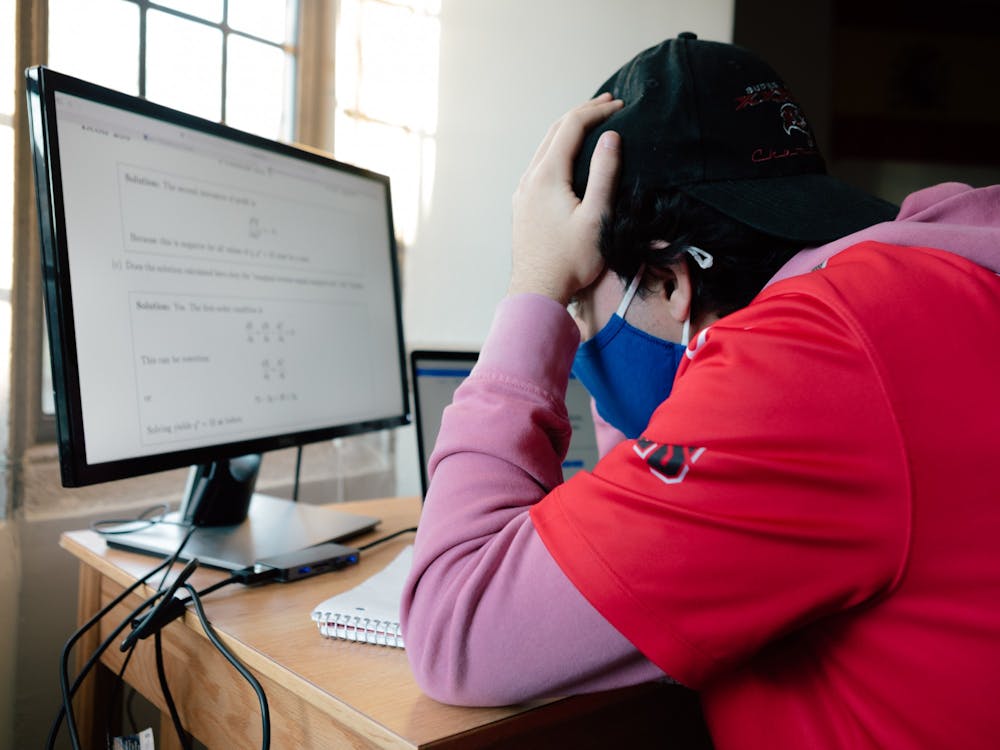A new study from a Duke research team shows how COVID-19 has taken a large toll on the mental health of the University's students, faculty and staff.
The research team—Project ROUSE (Reopen our University Safely and Effectively)—surveyed faculty, staff and students employed by Duke University to determine the prevalence of depression symptoms among a population of adults with a low risk of infection and high job security.
About 40% of respondents reported symptoms classifying them as at risk for moderate depression, and about 25% of respondents were at risk for severe depression, according to a paper pre-printed by the team and several other academics in January. These levels are drastically high in comparison to other studies in the general population pre-pandemic that found about 5% of adults in the United States were at risk for severe depression.
“The mental health impacts of the pandemic are huge [and] pervasive,” said Rachel Kranton, James B. Duke professor of economics, dean of social sciences and one of the founding members of the project.
One possible reason that younger respondents are reporting more depression symptoms is uncertainty about the future, the team’s data suggests. Project ROUSE assesses this by asking questions about participants’ progress, career and objectives. The survey, for example, asks participants to estimate “where they would have been if COVID hadn’t happened,” according to Kranton. Though the data for this question has not been analyzed yet, she expects to see a difference between uncertainty in students and faculty or staff.
The biggest challenge to the project was reaching the team’s target population, Kranton noted. Project ROUSE sought to collect data from all those employed by Duke, except those with a primary appointment in the health system. This was because healthcare workers experienced a different set of circumstances during the pandemic; their occupations caused them to be more directly affected.
The Project ROUSE team was “extremely grateful” to the university administration for giving them permission to email their target population, though they experienced a low response rate in certain segments of the workforce, Kranton said.
“I would hope that the practitioners out there just pay attention to our results,” Kranton said. “I have absolute faith in the folks at [Counseling & Psychological Services], and what I would like to see is that the people who make these decisions are talking to people who have a lot of information on student mental health.”
Jeff Kulley, psychologist, co-interim director and clinical director at CAPS, said that health professionals are doing just that.
“What we are thinking about are the delayed onset responses that people will have to their experiences during the pandemic and how to prepare ourselves for that wave of students coming in to see us,” Kulley noted.
Kulley explained that during the pandemic, there was a significant decline in the use of campus mental health services; however, he now expects a “rebound phenomenon of greater demand than there was prior to the pandemic.”
CAPS is also aware of students with anxiety and that the “opening back up of things, while it’s being celebrated as a positive thing in many ways, for some people is threatening,” Kulley said.
With Duke’s campus set to reopen, CAPS is planning to continue many strategies that worked well during the pandemic as well as provide more in-person options for counseling. The office adjusted to fit the needs of students during the pandemic by developing workshops and working with Blue Devils Care, Kulley said, adding that “the biggest adjustment was that [CAPS] went from doing no telehealth services to 100% telehealth services in the course of the pandemic.”
In the fall, CAPS plans to provide access to both in-person and virtual visits in order to provide “the best of both worlds,” Kulley said.
If you are experiencing symptoms of anxiety or depression, please call CAPS at 919-660-1000 or visit Blue Devils Care for support.
Get The Chronicle straight to your inbox
Signup for our weekly newsletter. Cancel at any time.

